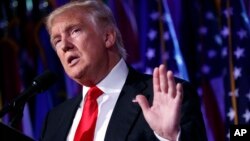American President-elect Donald-Trump and Chinese President Xi Jinping are reported to be planning a meeting to discuss relations between their countries.
Chinese state television said the two men agreed on Monday to meet “at an early date.” The two spoke by telephone.
The Chinese leader congratulated the businessman on his recent win in the U.S. presidential election. Chinese state television said Xi told Trump that “the only correct choice for China and the United States” is to cooperate.
Trump’s office in New York said that “During the call, the leaders established a clear sense of mutual respect for one another.” In addition, “President-elect Trump stated that he believes the two leaders will have one of the strongest relationships for both countries moving forward.”
During the campaign, Trump was critical of Chinese trade policies and efforts to influence the value of China’s currency on foreign exchange markets. He also threatened new taxes on Chinese goods being sold to the United States.
Joseph Cheng formerly served as a professor at City University of Hong Kong.
Cheng told VOA that Trump’s election comes at a time when China’s economy is slowing. He said that Chinese experts are hopeful over what they see as Trump’s isolationist ideas. They believe that, after he becomes president, the United States might reduce its security guarantees to Japan and South Korea. Cheng also said China is worried that Trump will put in place protectionist trade policies at a time when the Chinese economy is dependent on foreign trade.
South China Sea Disputes
During the campaign, Trump did not talk much about territorial disputes in the South China Sea. So it is not clear how he feels about China’s recent moves to develop the waterway. But some experts believe Trump will make a few strong military moves in the area to prove a point. They think he then will stop doing so and begin working with China on economic issues.
China claims about 95 percent of the South China Sea, which covers an area from Taiwan to Singapore. In 2010, China began expanding its control in the sea.
Sean King is a senior vice president at Park Strategies, a political advisory service. He says experts believe Trump may order U.S. naval ships to sail through the 3.5 million-square-kilometer sea to show it is open to all countries.
These experts believe such a move would support anti-China statements Trump made during the campaign. And they say it would make him appear stronger than President Barack Obama, who leaves office in January.
Trump has yet to announce his policy on the South China Sea. The United States is not among the six countries that claim control of some parts of the sea. But Obama has used warnings and has moved military resources into some areas to push China back.
On his campaign website, Trump said a larger deployment of American military resources would slow Chinese “adventurism.” Trump also criticized China for taking control of disputed islands in the sea and reclaiming land for others. China has reclaimed an estimated 1,295 hectares.
Trump’s policy on Asia might become clearer when he announces who will serve in high-level positions in his administration.
Trump has called China a “cheater” and a “currency manipulator.” But experts believe he will seek to work with the Chinese leadership because China’s large market and many factories are important to American businesses.
Exports of American goods to China totaled $113 billion in 2015. The US-China Business Council, a not-for-profit group, reported that China is the third-largest importer of American products after Canada and Mexico.
Lin Chong-pin is a retired strategic affairs professor in Taipei. He says Trump may reduce the military budget as he deals with domestic issues. That would limit U.S. military action in the South China Sea. And that, he says, would make China very happy.
I’m Jonathan Evans.
VOA’s Fern Robinson and Victor Beattie reported this story from Washington. Ralph Jennings reported from Taipei. Christopher Jones-Cruise adapted their stories for VOA Learning English. George Grow was the editor.
We want to hear from you. Write to us in the Comments Section, or visit our Facebook page.
_______________________________________________________________
Words in This Story
currency – n. the money that a country uses
isolationist – adj. of or relating to the idea that a country should not be involved with other countries
benefit – n. a good or helpful effect








